Amid energy policy debates, a battle over a natural gas pipeline in Appalachia
When developers first approached West Virginia farmer Maury Johnson in 2015 seeking to bury part of a 303-mile-long natural gas pipeline on his property, Johnson was not eager to comply. But with eminent domain laws giving Johnson few options to oppose the move, developers began construction a few hundred feet from his house in 2018.
It didn’t take long for Johnson to determine that the project was going to be a problem. Developers of the Mountain Valley Pipeline (MVP) project did not appear to be taking into consideration the nature of the area terrain, blasting the fragile landscape without regard for the underground caves, sinkholes, and natural springs that characterize the region.
Soon he realized the well water he relied on for household needs had become strangely murky. He started washing his clothes at a laundromat 25 miles away and catching rainwater to use for bathing. He remains without “usable” water even now, he said in a recent interview.
Johnson is among a contingent of critics who have come to view the MVP as a dire threat to the health of their Appalachian communities. They have a range of fears, including the potential contamination of air, water and soil with toxic chemicals used in the project. One particular concern is the fact that some scientists see the pipeline as uniquely dangerous: Because it snakes through highly unstable soils in landslide-prone mountain terrain, the pipeline could break and potentially explode, the critics warn.
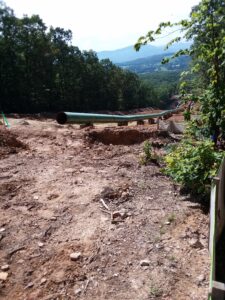
“There’s just no support for this pipeline,” said Emily Satterwhite, director of Appalachian studies at Virginia Tech in Blacksburg, Virginia, and a volunteer with an organization called Protect Our Water, Heritage, Rights.
Opponents of the project have been able to stall its completion by calling on courts to recognize what they say are numerous environmental hazards associated with the pipeline.
But key political leaders and other pipeline supporters remain committed to get the pipeline up and running, underscoring how far powerful oil and gas interests will go to push expansion of fossil fuel infrastructure despite mounting backlash against the fossil fuel dependence that is fueling climate change.
Among those championing the pipeline is US Sen. Joe Manchin, who has proposed legislation that supports completion of the Mountain Valley Pipeline. The measure would also speed up approvals for similar projects and limit opportunities for public input. Manchin has so far been unable to push the bill forward.
The latest version of the bill, released by Manchin’s office Wednesday, would leave in place a proposal to authorize Mountain Valley Pipeline, a contentious natural gas project vehemently opposed by progressives in the House and Senate. With Republicans taking control of the US House of Representatives in the new year, some observers say the pipeline could be aided by an energy and environment package the House hopes to pass as early as January 2023 that would support oil and gas projects, including restoring approval for the much-protested Keystone XL pipeline in the western US.
MVP says on its website that the pipeline is “essential for our nation’s energy security, energy reliability, and ability to effectively transition to a lower-carbon future.” The pipeline is currently 94% complete and could be ready to start operations in the second half of 2023, according to the developer.
A “continuing threat”
The pipeline is designed to transport natural gas from the the Marcellus shale fields of West Virginia southward through Virginia. A proposed additional project would extend the pipeline into central North Carolina. While the average interstate pipeline is 24 to 36 inches wide, MVP would have a 42-inch diameter, making it one of the largest natural gas pipelines in the US.
The 4th US Circuit Court of Appeals has repeatedly invalidated environmental permits for the project, including a US Forest Service permit that would allow MVP to cut through the Jefferson National Forest and a biological opinion from US Fish and Wildlife Service that concluded the project wouldn’t harm endangered species. Lawsuits by environmental groups related to MVP water crossings in Virginia and West Virginia also are challenging the project.
Yet the Federal Energy Regulatory Commission (FERC) recently granted MVP a four-year federal permit extension.
As MVP developers continue their efforts to complete the project, area landowners and academics are noting a host of environmental concerns.
The pipeline will cross about 1,000 streams, rivers and wetlands, raising concerns that the project could bring widespread impacts to waterways, said David Sligh, the conservation director of the nonprofit Wild Virginia.
Heavy sediment deposits associated with the pipeline can damage freshwater habitats, wiping out shelters and food sources for fish and also damaging fish gills. Scientists worry sediment runoff from the pipeline project will threaten vulnerable fish species, including the candy darter and the endangered Roanoke logperch.
“We’ve already had hundreds and hundreds of instances where they’ve washed the sediment and the soil into the streams,” said Sligh. “Some springs that people have been using for decades, for generations, that have always been clear, all of a sudden they get muddy. That raises the reality that work on this pipeline is affecting and could affect a lot more groundwater and surface water resources.”
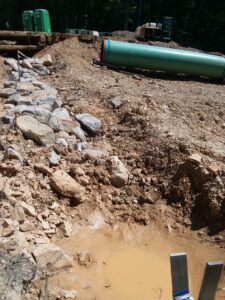
“I don’t think in the 42 years now that I’ve been in this business there has ever been a damage or a continuing threat to Virginia waters anything like this pipeline.”
Nan Gray, a soil scientist who lives in Craig County, Virginia who opposes the pipeline, said the project has already destroyed once-healthy soils farmed by local people, including small organic farms. One organic farm in West Virginia filed a complaint against MVP after a helicopter dropped erosion control pellets on the property in 2018 and the farm lost its certified organic status.
“Potentially alarming” toxins
Sligh also worries about toxic chemicals used in the project leaching into the environment, including pesticides applied to maintain the pipeline’s right-of-way. MVP’s 2017 Herbicide Use Plan mentions numerous chemicals it would spray both on the ground and from helicopters, including the weedkiller glyphosate, which is associated with a range of human and environmental health problems.
“A lot of these little mountain streams are small and pretty sensitive,” said Sligh. “We’re really concerned about how they might apply such chemicals.”
The coating of the pipeline itself, an epoxy coating commonly used in pipelines and manufactured by the company 3M, contains BPA, a known carcinogen. A 3M regulatory data sheet for the epoxy coating lists dozens of other chemicals designated as “not intentionally added,” including the toxic “forever chemicals” PFOS and PFOA. When asked about the designation “not intentionally added,” 3M said it means that “to the best of our knowledge, the product does not contain that substance,” but did not explain why these particular chemicals were included on the list.
Another concern is that toxins emitted by pipeline compressor stations may pose an airborne threat to nearby communities.
“The health effects from proximity to compressor stations are potentially alarming,” said Satterwhite. “There’s not a lot of great peer-reviewed research on it, but we know what they’re emitting. And we know that those are carcinogens.”
“We’re talking about compressor stations being placed in environmental justice communities where people are already poor and likely have health challenges,” she added.
MVP’s government-approved air pollution plan is unacceptable, according to Bill Limpert, a former water pollution compliance regulator with the Maryland Department of Environment.
“One of the biggest issues is that they fail to include radon, radioactive lead and radioactive polonium in their report, and I think that’s a really big issue,” he said.
Explosion potential
The Appalachian Mountains have a history of damaging landslides on steep and unstable terrain, raising the risks of damage to the pipeline and possible explosions, said Jacob Hileman, a hydrologist from southwest Virginia.
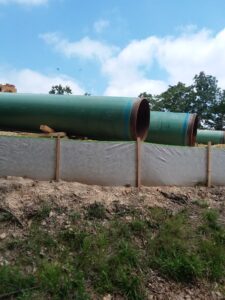
“MVP is a much, much riskier pipeline project than other large pipeline projects in the US,” said Hileman. “Anything that compromises the integrity of the pipeline has a high chance of leading to explosion.”
“The research I’ve seen on this suggests that above a certain maximum allowable operating pressure and diameter, these largest of the large pipelines, you should assume that there’s an 80% chance, if not greater, of an explosion if the pipe is compromised.”
As described in an MVP document, the US Forest Service has identified “high hazard zones” in Jefferson National Forest near the pipeline route with steep slopes, landslide-prone soils, and seismic activity. The pipeline passes right through the Giles County Seismic Zone.
In June, the Pipeline Hazardous Materials Safety Administration (PHMSA) issued an updated advisory bulletin “to remind owners and operators of gas and hazardous liquid pipelines…of the potential for damage to those pipeline facilities caused by earth movement in variable, steep, and rugged terrain.” The document notes that changing weather patterns caused by climate change may make some soils less stable, writing, “These phenomena can pose a threat to the integrity of pipeline facilities if those threats are not identified and mitigated.”
The fears are not hypothetical: In June 2018, the six-month-old Leach Xpress pipeline exploded near Moundsville, West Virginia, likely due to a landslide. Months later, the Revolution pipeline exploded in Beaver County, Pennsylvania, with one couple reportedly making a narrow escape before their home burned down.
“The MVP is much bigger than either of those two,” said Limpert. “The explosion would be catastrophic. The fireball, if it exploded, would go out 1,100 feet in all directions from the point of detonation and would very likely kill or seriously injure anybody in that zone.”
Adding to risk is the fact that some sections of the pipeline have been sitting above ground for years, even though the National Association of Pipe Coating Applicators has stated that storing such pipes above ground for more than six months is not recommended because extensive sun exposure can corrode the protective coating.
MVP did not respond to a request for comment on questions about potential risks, but says in a statement on its website that safety “is our priority in everything we do.”
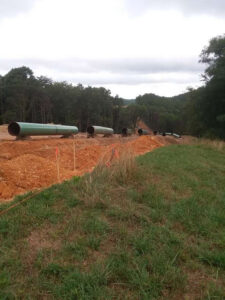
The company states: “Regular inspections will occur to ensure pipeline integrity. The pipeline will be monitored 24-hours-a-day, 365-days-a-year using sophisticated computerized systems and around-the-clock personnel.”
FERC declined to comment about MVP’s risk of exploding.
“Nothing to fight with”
During the first year of MVP construction on his property, Johnson filed roughly 200 complaints with state regulators, he said. And by August 2021, he was so frustrated with the situation that he filed a complaint with FERC. No one from the commission or any other regulatory agency has responded to his complaints, he said.
In Giles County, Virginia, just across the state border from Johnson, farmer Jammie Hale’s life hasn’t been the same since MVP arrived near his property in 2018.
During construction, Hale’s well water developed an odd milky color from what he believes was discarded clay mud. While his well water later returned to normal, the ponds his livestock relied on dried up. Many animals became sick and died from drinking the manure-heavy water at the bottom of the stagnating ponds, he said. And though he can’t prove it, Hale said he is convinced the pipeline project destroyed his livelihood by disrupting the groundwater’s flow.
“Heavy machinery and vibrations from the equipment would cause [the ground] to collapse and divert the water into other places,” said Hale. “I couldn’t afford to get a lawyer, I couldn’t afford to have any studies done or tests to see exactly where my water was coming from. When you’re poor, you ain’t got nothing to fight with.”
Explosion risk is also an issue of great personal concern for Hale.
“My house could be burned down, blown up,” he said. “My family could be killed.”
“My day used to start when I’d get up and feed and water animals,” he added. “After all that is gone and the pipeline is here, every morning when I get up, I’m trying to find a way of stopping this pipeline.”
(Featured Photo: A sign protesting the MVP in Giles County, Virginia. Photo by Shannon Kelleher.)
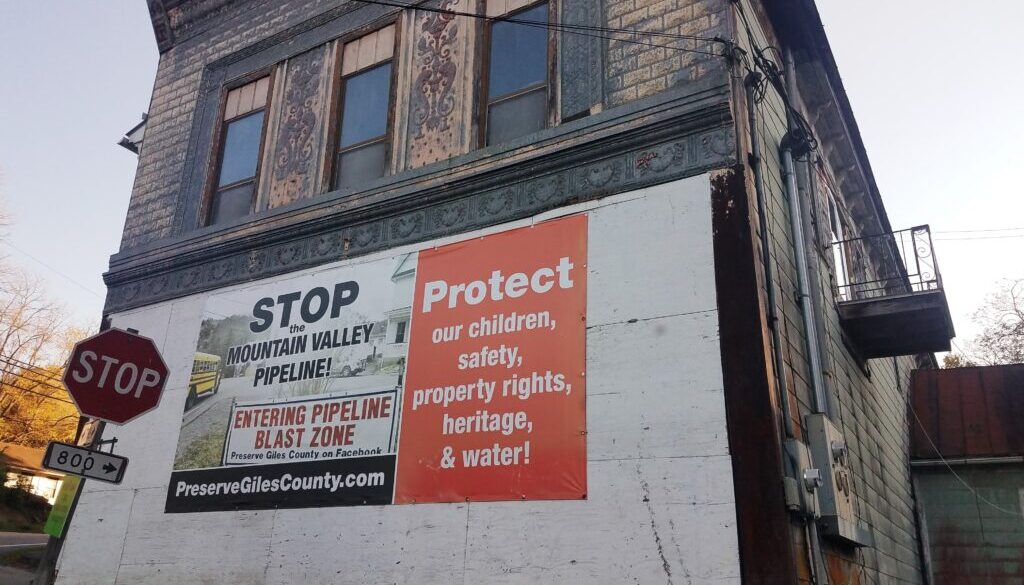




December 6, 2022 @ 2:58 am
Thank you for publishing this enlightening article.